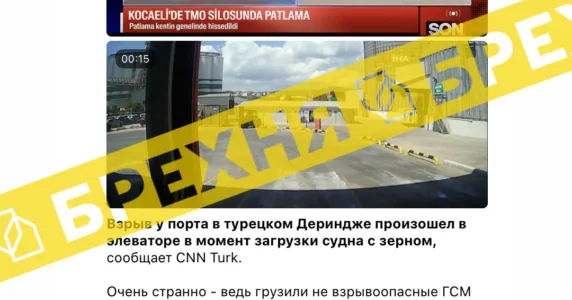Navigation and useful materials
“Ukraine needs a grain corridor not for humanitarian purposes, but for terrorist activities,” “Ukraine sent only 2.5% to poor countries,” “Ukraine’s statements about hunger are only a cover for the desire to earn money”…. All these narratives have been vigorously disseminated by propaganda over the past year. They are the official justification for Moscow’s withdrawal from the grain deal.
The Centre for Strategic Communication refutes Russia’s fakes and manipulations about the grain initiative.
What preceded the Russian démarche
A year has passed since the signing of trilateral agreements between Turkey, the UN, and Ukraine and Turkey, the UN, and Russia on the unblocking of the Black Sea ports of Ukraine to restore maritime grain exports. In exchange for abandoning the blockade and terror, Russia was allowed to inspect merchant ships heading to or from Ukrainian ports. The parties agreed that the grain initiative would last 120 days with the possibility of extension.
Until 2023, the work of the grain corridor was satisfactory. Ukraine, although not at full capacity, did resume the supply of its agricultural products to world markets, including African countries and other regions in need. Until January, it was possible to export from 3 to 4 mln tons of products per month.
As a result, wheat prices in the world stabilized, and the threat of a food crisis decreased. Despite the traditional blackmail of Moscow, the operation of the corridor was extended after the initial term of the agreement expired. However, 4 months after the resumption, the story began to take on other shapes. The Russians decided to permanently discontinue the work of the ports.
Since the beginning of the new year, the Ministry of Agrarian Policy and Food has systematically reported anti-records in the daily number of exits of vessels with Ukrainian grain. Effectively, it was about 2–3 ships per day, with a normal throughput of 6–7 ships for the same period of time. The reasons for the delays were artificial, which will be discussed later. In May, Moscow reluctantly agreed to once again extend the initiative for two months (until July 17) and stated that the promised easing of sanctions imposed on Russian agricultural products and mineral fertilizers did not happen; hence, this agreement was a complete deception of Russia.
In fact, according to UN data, in the first 10 months of 2022, Russian fertilizer exports increased by 70% (to USD 16.7 bln) compared to the same period in 2021, while sales abroad fell by only 10%.
In the last weeks of the formal agreement, Russia effectively paralysed its work. In July, only 260,000 tons of products passed through the grain corridor. Currently, Ukrainian ports are blocked and shelled by the Russian military.
The lie about “only 2.5% of the grain made it to poor countries”
The statements about the “2.5%” of Ukrainian exports to meet the needs of poor countries were voiced even by completely pro-Ukrainian specialists on numerous media platforms. This is one of the most unfortunate false statements that negates Ukraine’s role in countering the food crisis in the world. To refute it, let us present the facts.
In the course of operation of the grain corridor, Ukraine exported about 33 mln tons of agricultural products (official data of the Joint Coordination Centre of the Black Sea Grain Initiative). These volumes cover 11 positions of different crops. 70% of the grain went to rich countries, but it’s mostly corn that poor countries don’t need. Both before the full-scale war and during the wartime year, we supplied mostly wheat and a small percentage of other crops to the countries of Africa. This export structure is formed not because of Ukrainian whims, but because such is the demand of these countries.
In total, about 9 mln tons of wheat were exported as part of the grain initiative. Of these, 2.5 mln tons were delivered to countries in need (Kenya, Somalia, Ethiopia, Sudan, Bangladesh, Yemen), which is 28% of the total amount of wheat shipments. More than 700,000 tons of wheat were exported within the framework of the humanitarian programs of the UN World Food Programme and Grain From Ukraine. These are 24 vessels that delivered thousands of tons of wheat to Ethiopia, Yemen, Kenya as humanitarian cargo. But even if we calculate the percentage of supplies to poor countries of the total volume of all exported agricultural products (33 million tons), it is still 12.3%, not 2.5%.
In 6 months of this year, Russia exported about 10 mln tons of grain to Africa, mainly to Egypt and Algeria — not the poorest countries; it exported 0% to those in real need.
Ukraine — food guarantor for Kenya and Ethiopia
Separately, we will dwell on the countries that have been consumers of Ukrainian wheat for years. These are Ethiopia and Kenya.
Over the past year, Ukraine has covered 20% of Ethiopia’s food needs. 1.5 mln tons of wheat are needed to feed the country each year (USDA data). That is, for the last export season 2022/23 (July 1, 2022 – June 30, 2023), 303,400 tons of our grain were exported there. This is slightly less than during the 21/22 season, when we shipped 445,000 tons to Ethiopia.
Supplies to Kenya have even increased compared to the pre-war season. 385,000 tons were shipped there, while in the 2021/22 season, 30,000 tons less were shipped. Thus, we provided the needs of Kenya, which annually amount to 2.2 mln tons, by 18%.
Russia has not supplied a single ton of grain to these countries, and at the same time, Russian Foreign Ministry spokeswoman Maria Zakharova quite seriously declares to African partners that Russians are fighting in Ukraine for Africa and defending the right of Africans to be free with their lives. She did not explain exactly what kind of freedom she was talking about.
READ ALSO: Africa’s True Allies Are in Kyiv, not Moscow
By the way, the population of both Kenya and Ethiopia has grown tremendously over the past decades. According to the World Bank, Ethiopia’s population has almost doubled, up to 120 mln. Kenya’s population has grown by 20 mln people over the same period. Ukraine, despite the war, covers significant amounts of food needs of these countries, which will only grow, given the rapid increase in population.
The grain corridor myth as a way for saboteurs
Valentina Matvienko, a colleague of Zakharova and speaker of the Federation Council, likes to say that Ukrainians needed the sea corridor for sabotage. But the Russians do not have any specific facts and evidence to support this rhetoric.
Similarly, none of the Russian senior officials in their statements mentioned how, for many months, Russia blocked the work of the grain corridor artificially and groundlessly. Russian inspectors, using the right granted to them, deliberately delayed inspections of ships on the Bosphorus. They demanded unregulated documentation, found unreasonable reasons to discontinue the inspection. Instead of six ships a day, the number of passes at the end of the agreement fell to one.
The Russians pretended as if they were looking for the weapons they were gossiping about (allegedly, it wasn’t grain that was transported). Videos were shared on social networks showing how they almost dismantled ships, which the official inspection procedure, of course, did not provide for. Obviously, the Russians did all this not in search of non-existent weapons, but to reduce the throughput and, accordingly, the efficiency of the grain corridor.
Silenced reality
In March-April, 145 vessels could be in a queue for an inspection of the Joint Coordination Centre. Of course, such downtime was very profitable for the Russians because the insane costs for this fell on the shoulders of Ukrainian agrarians, who still had to pay the owners of ships for rent. At the same time, Russia took advantage of the possibility of unimpeded commercial shipping from its Black Sea ports.
The volume of Russian transportation in the Azov-Black Sea basin in 2022 amounted to more than 250 mln tons, which exceeded the figures for 2021. This, in particular, made it possible for Russia to use merchant ships for the hidden delivery of military goods (which Moscow hypocritically accused Kyiv of).
As a result, due to the hybrid blockade, according to experts, the world did not receive millions of tons of Ukrainian agricultural products, in particular, Ethiopia and Yemen. In the latter, according to UN estimates, almost two tens of millions of people suffer from the food crisis.
Will Africa see the promised Russian grain?
Since last autumn, Putin has repeatedly told that Russia can cover the needs of African countries, and that its grain (the one stolen in Ukraine) will be enough for everyone. However, having large harvests of more than 100 mln tons, Russia did not send any humanitarian cargo to Africa at its expense either before the war or during the war.
Instead, according to the results of recent years, it was Ukraine that was the leader in the framework of the UN World Food Programme to supply food for humanitarian operations. In general, in 2021, Ukraine delivered the most food under the UN programmes — 20% of the total volume. But the Russians have their opinion of this story. They believe that the UN is interested in the operation of the grain corridor only because all the powerful assets of the agricultural sector of Ukraine are concentrated in the hands of the Americans. This is another favourite propaganda narrative. At the same time, they do not indicate any name of the agricultural holding, knowing that the founders of our most powerful agricultural corporations, such as Kernel or MHP, are Ukrainians.
Putin’s recent meeting with leaders and representatives of African countries at the Russia-Africa Summit on July 27-28 ended with a promise of free 25,000 to 50,000 tons of grain to six countries: Burkina Faso, Zimbabwe, Mali, Somalia, Eritrea, and the Central African Republic. The announced volume does not cover even 5% of the needs of these countries. Time will show whether these promises will be fulfilled, or the gesture of unprecedented generosity will remain just a PR move of the Russian president.
In any case, Russia is trying to turn the African Union into a puppet which it can control and demand the necessary votes in the UN General Assembly, to provoke Africans to blackmail Europe so that the latter provides them with food free of charge, and in general to encourage them to beg for help. For this, perhaps, Russia will one day provide them with several tens of thousands of tons of grain free of charge.
Ukrainian agricultural products impact world prices
While Putin pretends to be a philanthropist, wheat prices in the world began to rise, which is directly related to the official withdrawal of Russia from the grain deal on July 17. Currently, the cost has already increased by 5% (17/07-28/07 Chicago Exchange), and experts predict its further increase.
Without the operation of the Corridor, according to experts, the world has every chance of experiencing an increase in the price of sunflower oil by 20-25%. All this is evidence that Ukraine plays a significant role in shaping the price of agricultural products on the international market, so it has a lever of influence on food security.
Of course, Russia understands this, so it uses food and lies as a weapon in its hunger games with the world.
If you have found a spelling error, please, notify us by selecting that text and pressing Ctrl+Enter.

